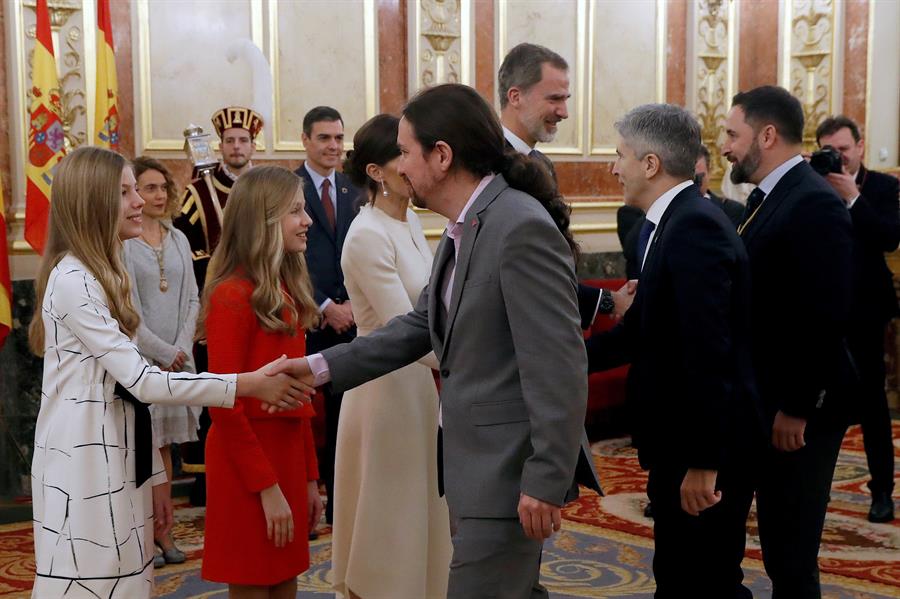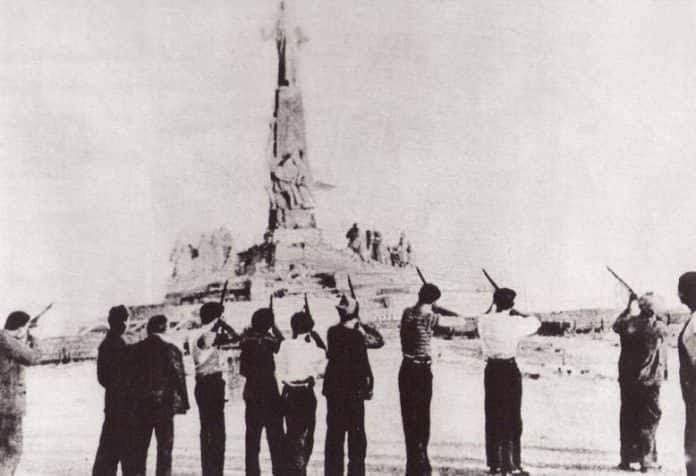
Spanish – The Spanish Penal Code will be reformed to criminalize any apologism of Francoist Spain, according to the electoral promise of the socialist president Pedro Sánchez. “Finally,” celebrated PSOE deputy secretary-general, Adriana Lastra, announcing that “in democracy, neither dictators nor tyrants are honored.”
Nevertheless, Sánchez was the first Spanish president in decades to visit Cuba during the communist regime that has subjugated the island for more than 61 years. He even brought the King of Spain to the island for the first time, although the regime forbade the monarchs to meet with the Cuban opposition.
In response, the Vox party, which is now Spain’s third-largest political force, has accused Pedro Sánchez of capitalizing on the monarchs. Subsequently, Vox leaders have tried to have the trip to Cuba legally suspended to prevent the monarchs from being complicit in the socialist agenda.
Lastra: "Reformaremos el Código Penal para que la apología del franquismo sea delito. En democracia no se homenajea ni a dictadores ni a tiranos".
En España hay ministros que hacen apología de los Castro y de Maduro.
Y se homenajea a los asesinos de ETA.pic.twitter.com/k6OxSOHHX6— Guaje Salvaje (@GuajeSalvaje) February 10, 2020
Spanish socialist government finances the Cuban communist party
And the complicity of the Spanish government is not limited to the diplomatic presence. On Tuesday, November 12, 2019, guided by the agenda of the PSOE and Unidas Podemos, King Philip II signed the Country Association Framework, a cooperation agreement between Spain and Cuba, to implement projects costing 57 million euros in different areas until 2022.
A year before the King signed this agreement, Pedro Sánchez himself traveled to Cuba in November 2018 to negotiate the postponement of the payment of the 300 million euro debt that Cuba owes to some 300 Spanish companies.
Madrid City Council pays tribute to the Sandinista government of Nicaragua
Although the Spanish Socialist Workers’ Party claims that they honor neither dictators nor tyrants, the Platform of Solidarity with Nicaragua and the Sandinista Front organized an event in Madrid’s City Hall in 2018. Using public funds and spaces, it presented its solidarity with the Nicaraguan authorities. It denounced the social protests that resulted in the death of more than 600 civilians as “coup” and “destabilizing” operations.”
The diplomatic corps of Cuba and Venezuela attended the event, prompting condemnation from legislators who are not aligned with the left.
The Spanish socialist government has also failed to take a stand on the religious persecution in Cuba and Nicaragua, where churches are a refuge for demonstrators who are trying to avoid being shot by forces allied with the regime, who have even entered the places of worship.
In fact, the most prominent political and religious persecution was the case of “Los aguadores.” In November, 16 people were arrested for bringing water to the San Miguel Arcángel Church, where mothers were on a hunger strike to demand the release of their children, who had been arrested for participating in demonstrations against Daniel Ortega’s regime.
The Spanish socialists are silent about the religious persecution of their former and current comrades
The PSOE also does not condemn the religious persecution exercised by its ideological predecessors in Spain. According to Libertad Digital, there are “a total of some 10,000 dead for the crime of being Catholic and not renouncing their faith.” About 30% of the clergies in Madrid and 62% in Lérida were shot.
“About 4,184 priests, 2,365 friars and monks, 283 nuns, and more than 3,000 ordinary people were killed. In total, some 10,000 died for the crime of being Catholic and not renouncing it. Of these, some 3,000 were killed between July and August 1936.:
Monsignor Florentino Asensio, Bishop of Barbastro in 1936, had his genitals amputated by militiamen who announced, “Don’t be afraid. If what you preach is true, you will soon go to heaven,” to which he responded, “yes, and there, I will pray for you.” After killing him, they pulled out his teeth and stole his clothes.
Before the beginning of Francisco Franco’s rule, 22,000 churches were destroyed, while the press of the time celebrated the destruction of religious symbols and statues. Under Karl Marx’s premise that “religion is the opium of the masses,” the militia sought to eliminate the Catholic Church and its leaders at all costs.

According to La Vanguardia de España, “to fight against the rise of the ultra-right-wing of Vox,” after the exhumation and transfer of the remains of Francisco Franco from the Valley of the Fallen, the PSOE wants to deepen this type of symbolic initiatives of left-wing political significance to mobilize its electorate.
What they don’t see is that their obsession with the past costs them votes in the present. Nationally, at least 300,000 PSOE voters voted for Vox, a party that considers the Civil War as a painful period for the entire nation and therefore invites them to view it without bias.
“Only a privileged minority of those who never suffered the consequences of wanting to be free in a Spain that was not free can look back on that dark past with nostalgia,” said PSOE deputy secretary-general Adriana Lastra, in memory of “the victims of a terrible dictatorship that took away our freedom and sowed pain and injustice.”
Given her age, Adriana didn’t live through it either. However, she denies the pain of those who were persecuted by the Reds in the 1930s in Spain, just as her party does today with the victims in Nicaragua, Cuba, and Venezuela, where they not only support but also finance oppressive regimes.
The so-called rejection of dictatorships and tyrannies by the PSOE does not apply to its allies.
The proposal is still in the pipeline. Legal experts have pointed out the unconstitutionality of this censorship measure proposed by the PSOE. It would be undemocratic and authoritarian if speech is regulated and criminalized.
So if they are going to denounce a dictatorship, let them apply the same logic to all tyrannies, beyond ideology.
 Versión Español
Versión Español













